Discovering What are the 7 Essential Seeds: A Comprehensive Guide to Nutritional Powerhouses
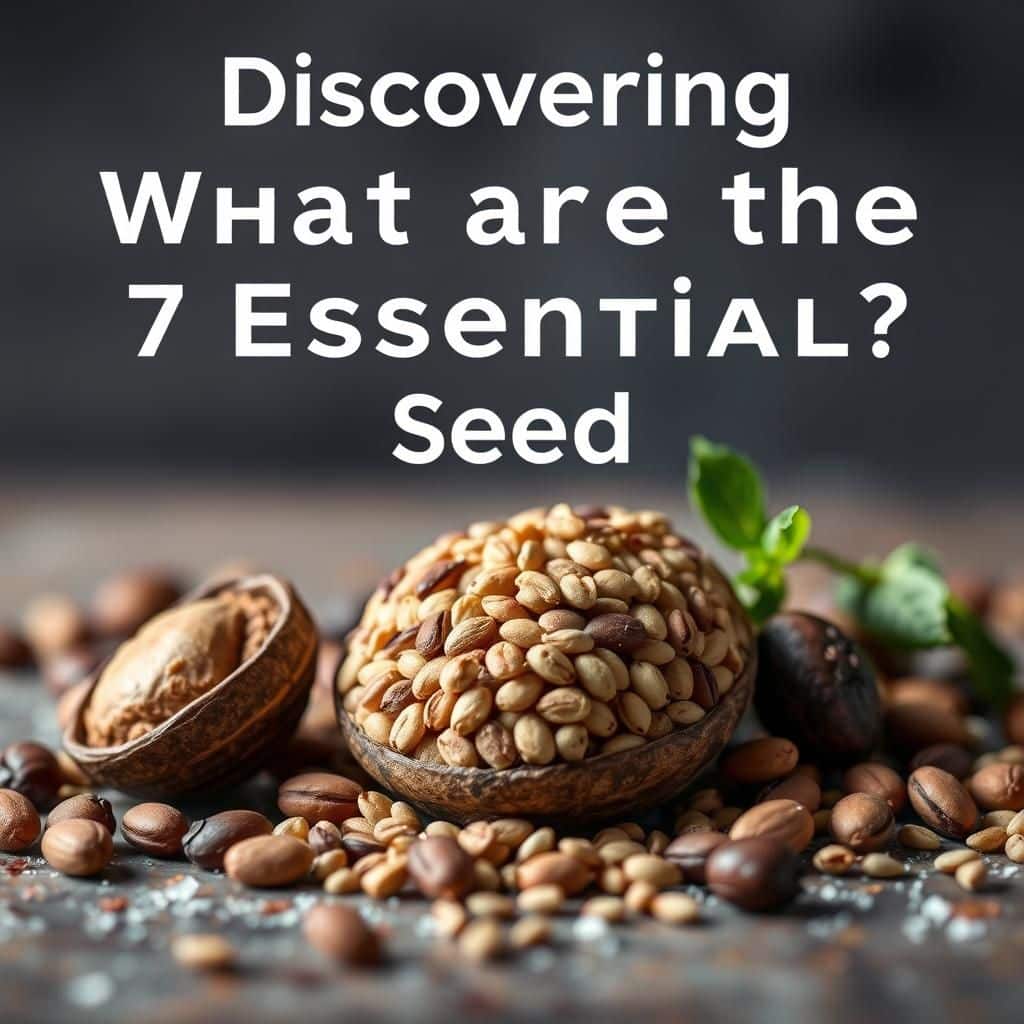
In the quest for optimal health, superfoods have gained significant attention, and seeds are among the most potent nutritional powerhouses. This comprehensive guide delves into the seven essential seeds that can elevate your diet and enhance overall well-being. From boosting heart health to supporting weight management, these tiny but mighty seeds are packed with vital nutrients including proteins, healthy fats, vitamins, and minerals. Enriching your meals with these seeds not only adds flavor and texture but also provides incredible health benefits. Join us as we explore each seed's unique qualities, nutritional profiles, and creative ways to incorporate them into your daily diet.
What Are the 7 Essential Seeds?
The 7 essential seeds refer to a selection of seeds that are packed with nutrients and health benefits, making them vital for a balanced diet. These seeds include chia, flax, hemp, pumpkin, sunflower, sesame, and quinoa seeds, each offering unique attributes such as high protein content, omega-3 fatty acids, and various vitamins and minerals. Incorporating these seeds into meals can boost nutritional intake, enhance energy levels, and support overall well-being. They can be easily added to smoothies, salads, and baked goods, making them versatile additions to any diet.
Chia Seeds
Chia seeds are tiny, nutrient-dense seeds derived from the Salvia hispanica plant. They are an excellent source of omega-3 fatty acids, fiber, and protein, which contribute to heart health and digestive wellness. When soaked in liquid, chia seeds expand and form a gel-like consistency, making them a popular choice for puddings and smoothies.
Flax Seeds
Flax seeds are rich in lignans, which are antioxidants that help combat oxidative stress in the body, as well as being an excellent source of fiber and omega-3 fatty acids. They can be consumed whole or ground for better absorption of nutrients, and are often added to oatmeal, cereals, or baked goods for a nutty flavor and additional health benefits.
Hemp Seeds
Hemp seeds are particularly high in protein and contain all nine essential amino acids, making them a complete protein source. They are also abundant in healthy fats, including omega-3 and omega-6 fatty acids. With a slightly nutty flavor, hemp seeds are a great addition to salads, smoothies, and energy bars.
Pumpkin Seeds
Pumpkin seeds, also known as pepitas, are packed with magnesium, zinc, and iron, all of which are essential for various bodily functions. They are rich in antioxidants and have been linked to improved heart health and prostate health. These seeds can be enjoyed roasted as a snack or sprinkled on salads and soups for added texture.
Sunflower Seeds
Sunflower seeds are an excellent source of vitamin E, which plays a crucial role as an antioxidant in the body. They also provide healthy fats and minerals such as selenium, which supports immune function. Often eaten as a snack or used in granola and trail mixes, sunflower seeds offer a satisfying crunch and numerous health benefits.
| Seed | Key Nutrients | Health Benefits |
|---|---|---|
| Chia | Omega-3, Fiber | Heart Health, Digestive Wellness |
| Flax | Fiber, Lignans | Oxidative Stress Relief |
| Hemp | Protein, Healthy Fats | Complete Protein Source |
| Pumpkin | Magnesium, Zinc | Heart Health, Prostate Health |
| Sunflower | Vitamin E, Selenium | Antioxidant Support, Immune Function |
What are the 7 seeds for weight loss?

The 7 seeds for weight loss are a selection of seeds that can help support weight management through various beneficial properties. These seeds are packed with nutrients, fiber, and healthy fats, which can help regulate appetite, improve digestion, and enhance overall health. Here are the seven seeds that are particularly beneficial for weight loss:
1. Chia Seeds
Chia seeds are rich in fiber, which can help promote a feeling of fullness and reduce overall calorie intake. They also absorb water, expanding in the stomach and delaying hunger signals. Their omega-3 fatty acids contribute to heart health while providing energy.
Benefits of Chia Seeds for Weight Loss
- High Fiber Content: Aids in digestion and promotes satiety.
- Omega-3 Fatty Acids: Supports heart health, which is essential for maintaining an active lifestyle.
- Versatile Usage: Can be added to smoothies, yogurt, or salads easily.
2. Flaxseeds
Flaxseeds are another excellent source of fiber and omega-3 fatty acids. They have lignans, which can enhance metabolism and reduce insulin resistance. Ground flaxseeds are often easier for the body to absorb the nutrients.
Benefits of Flaxseeds for Weight Loss
- Boost Metabolism: May help improve metabolic rate.
- Reduce Hunger: High fiber keeps you feeling full longer.
- Easy to Incorporate: Can be sprinkled on various foods.
3. Pumpkin Seeds
Rich in magnesium, pumpkin seeds support overall metabolic health. They also contain high levels of protein and healthy fats, which can help curb cravings.
Benefits of Pumpkin Seeds for Weight Loss
- Protein-Rich: Helps in muscle repair and growth, reducing fat mass.
- Healthy Fats: Provide satiation and help regulate blood sugar levels.
- Mineral Content: Essential for energy production.
4. Sunflower Seeds
Sunflower seeds are a good source of vitamin E and magnesium while providing healthy fats. They can help enhance skin health and provide energy for workouts, which can assist in weight loss.
Benefits of Sunflower Seeds for Weight Loss
- Rich in Nutrients: Supports overall health during weight loss.
- Energy Source: Ideal for pre-workout snacking.
- Variety of Uses: They can be added to salads, cereals, or eaten as a snack.
5. Sesame Seeds
Sesame seeds are rich in calcium and beneficial fatty acids. Their high fiber content can help in weight management by promoting a sense of fullness.
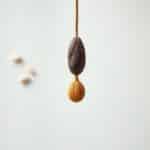
Benefits of Sesame Seeds for Weight Loss
- Calcium Rich: Important for bone health, especially during weight loss.
- High in Antioxidants: Helps combat oxidative stress associated with dieting.
- Diverse Applications: Can be used in tahini or as a topping.
6. Hemp Seeds
Hemp seeds are packed with protein and essential fatty acids, which can help maintain energy levels and reduce hunger. They contain all essential amino acids, making them a complete protein source.
Benefits of Hemp Seeds for Weight Loss
- Complete Protein: Supports muscle gain and fat loss.
- Omega-3 and Omega-6: Balance promotes heart and skin health.
- Nutrition Dense: Provides fiber to aid digestion.
7. Psyllium Husks
Though technically not a seed, psyllium husks are derived from the seeds of the Plantago ovata plant and are known for their incredible fiber content. They help regulate digestion and control appetite.
Benefits of Psyllium Husks for Weight Loss
- High Soluble Fiber: Aids in creating a feeling of fullness.
- Promotes Digestive Health: Supports regular bowel movements.
- Lower Cholesterol Levels: Can aid in heart health.
What are the 7 seeds for pregnancy?
What are the 7 Seeds for Pregnancy?
The concept of 7 seeds for pregnancy refers to a combination of nutrient-rich seeds believed to support reproductive health and enhance fertility. These seeds provide essential vitamins, minerals, and fatty acids that are crucial for both male and female fertility. The seven seeds commonly associated with improving chances of conception include:
- Flaxseeds
- Sunflower seeds
- Pumpkin seeds
- Sesame seeds
- Chia seeds
- Hemp seeds
- Poppy seeds
Flaxseeds
Flaxseeds are one of the most nutrient-dense seeds and are rich in omega-3 fatty acids, which are essential for maintaining hormonal balance. They also contain lignans and fiber that help reduce inflammation and support reproductive health.
- High in omega-3 fatty acids that promote heart health
- Rich in lignans, which can enhance estrogen metabolism
- Contains antioxidants that help reduce oxidative stress
Sunflower Seeds
Sunflower seeds are packed with vitamins and minerals, particularly vitamin E, which is known for its antioxidant properties. This nutrient helps protect reproductive cells from damage and can enhance fertility in both men and women.
- High in vitamin E, which is vital for reproductive function
- Contains selenium, which may improve sperm quality
- Rich in healthy fats that support overall health
Pumpkin Seeds
Pumpkin seeds are loaded with zinc, a crucial mineral that plays a significant role in hormone production and fertility. They can help boost both male and female reproductive health.
- High in zinc, essential for sperm production in men
- Rich in magnesium, which helps regulate hormones
- Contains antioxidants that promote cellular health
Sesame Seeds
Sesame seeds are a source of various essential nutrients, including calcium and magnesium. These nutrients are important for overall health, hormonal balance, and can support reproduction.
- Rich in calcium, which is important for hormone secretion
- Contains vitamin B6, which can improve ovulation
- High in fiber that aids in digestion and hormone regulation
Chia Seeds
Chia seeds are known for being rich in omega-3 fatty acids, fiber, and protein. These nutrients can help enhance fertility by providing energy and promoting hormonal balance.
- High in omega-3 fatty acids for reducing inflammation
- Rich in fiber, supporting digestive health
- Sustaining energy levels, which can be beneficial during conception
Hemp Seeds
Hemp seeds contain high levels of protein, omega-3, and omega-6 fatty acids, making them a well-rounded addition to a fertility diet. These seeds are also rich in GLA (gamma-linolenic acid), which can help in hormonal balance.
- Rich in protein for overall health and hormone production
- Contains essential fatty acids that support reproductive health
- High in GLA that may help with hormonal regulation
Poppy Seeds
Poppy seeds are a lesser-known but nutrient-rich option. They contain essential minerals such as calcium, iron, and magnesium which contribute to general health and hormonal balance that is essential for conception.
- High in calcium, important for ovulation and fetal development
- Contains iron, which supports healthy blood circulation
- Rich in magnesium, aiding in hormonal balance
What is the healthiest seed you can eat in the world?
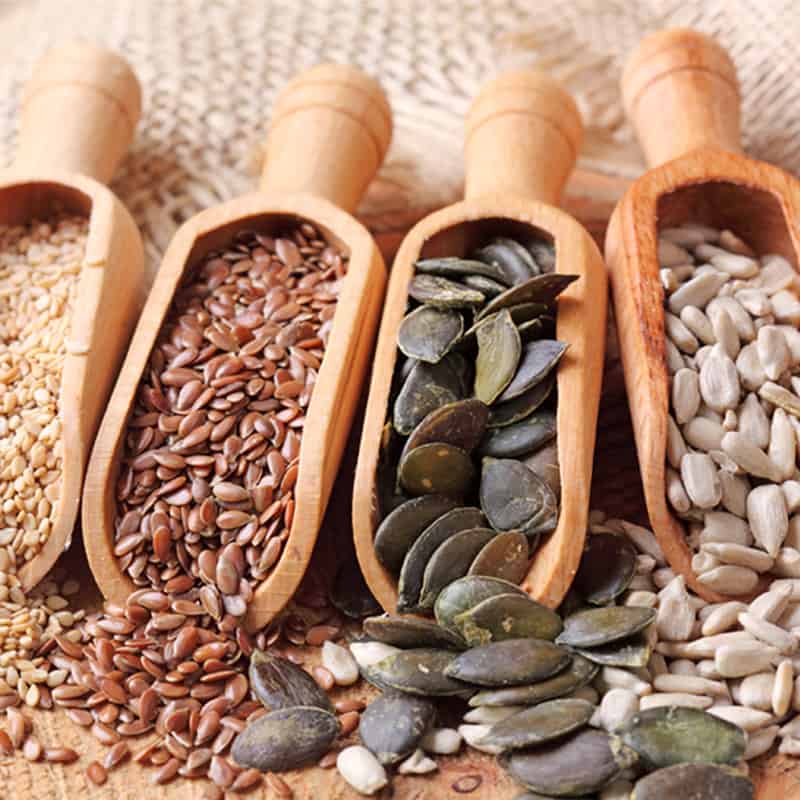
The healthiest seed you can eat in the world is often considered to be chia seeds. These tiny seeds pack a powerful nutritional punch, offering a variety of health benefits that make them a popular choice among health enthusiasts.
Nutritional Profile of Chia Seeds
Chia seeds are known for their impressive nutritional content. They are rich in several essential nutrients, making them a great addition to any diet. The following are some key components of chia seeds:
See also:
- High in Omega-3 Fatty Acids: Chia seeds provide a plant-based source of omega-3s, which are vital for heart and brain health.
- Rich in Fiber: They contain approximately 34 grams of fiber per 100 grams, aiding digestion and promoting a feeling of fullness.
- Good Source of Protein: Chia seeds have a high protein content, offering about 17 grams of protein per 100 grams, which is beneficial for muscle repair and growth.
Health Benefits of Chia Seeds
Incorporating chia seeds into your diet can lead to numerous health benefits. Here are some notable advantages:
- Weight Management: The high fiber and protein content help control appetite, which can support weight loss efforts.
- Bone Health: Chia seeds are a great source of calcium and phosphorus, nutrients essential for maintaining strong bones.
- Blood Sugar Regulation: They may help stabilize blood sugar levels, making them a smart option for those with diabetes.
How to Incorporate Chia Seeds into Your Diet
Chia seeds are versatile and can be easily added to various meals. Here are some practical ways to enjoy them:
- Add to Smoothies: Blend them into smoothies for added texture and nutrition.
- Make Chia Pudding: Soak them in milk or a milk alternative to create a filling chia pudding.
- Sprinkle on Salads: Use them as a topping for salads and bowls to increase their nutrient density.
Comparative Analysis with Other Seeds
When compared to other popular seeds, chia seeds hold their own regarding health benefits. Here’s a brief comparison:
- Flax Seeds: While great for omega-3s, they offer less fiber than chia seeds.
- Hemp Seeds: Although high in protein, they are lower in fiber than chia.
- Sunflower Seeds: These are higher in calories and fat but offer different vitamins and minerals.
Possible Drawbacks of Chia Seeds
Despite their numerous benefits, chia seeds may not be suitable for everyone. Consider the following potential drawbacks:
- Digestive Issues: Some individuals may experience bloating or discomfort if consuming large quantities.
- Caloric Density: While nutrient-rich, chia seeds are still calorically dense; portion control is essential.
- Aspiration Risk: If not consumed with sufficient liquid, chia seeds can swell and pose a choking hazard.
What is the 7 seeds mix?
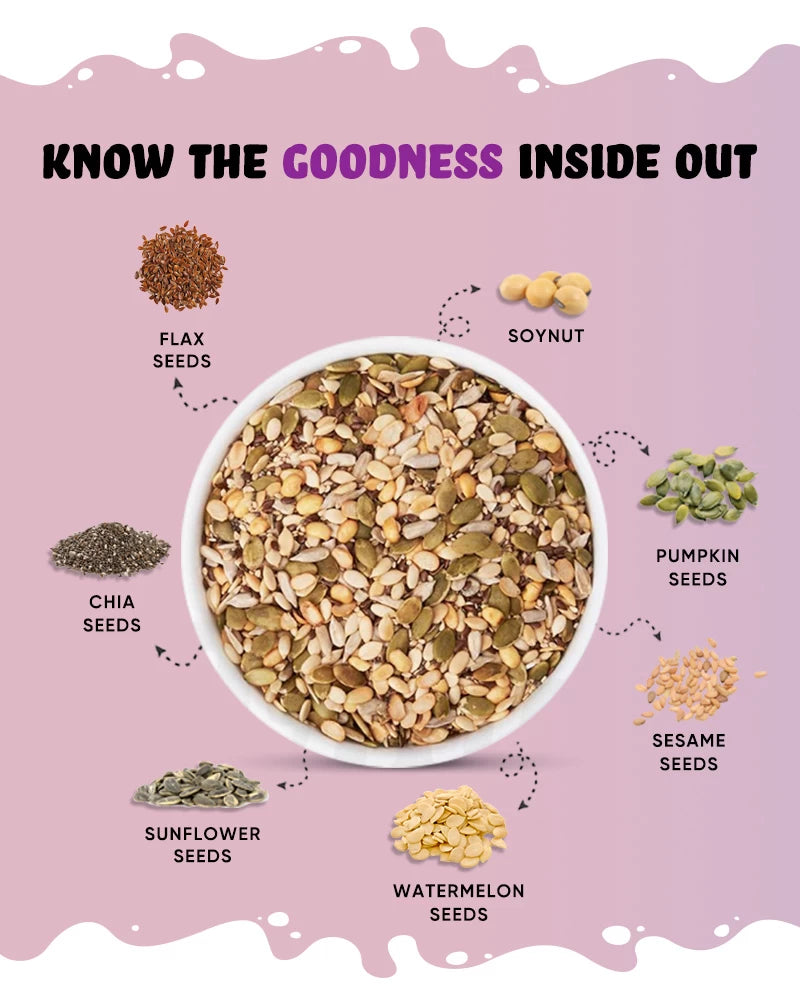
The 7 seeds mix is a blend of various seeds commonly known for their nutritional benefits. This mix usually includes a combination of seeds that are rich in essential fatty acids, proteins, and a variety of vitamins and minerals. The specific seeds included can vary by brand or personal preference but typically feature a mix that is both savory and versatile for culinary uses.
What Ingredients Are Commonly Found in 7 Seeds Mix?
The ingredients in a typical 7 seeds mix can vary, but commonly used seeds include:
- Sunflower seeds - High in vitamin E and healthy fats.
- Pumpkin seeds - Rich in magnesium and zinc.
- Flaxseeds - A great source of Omega-3 fatty acids.
- Chia seeds - Packed with fiber and antioxidants.
- Sesame seeds - Provide calcium and healthy fats.
- Hemp seeds - Contain protein and essential amino acids.
- Quinoa seeds - A complete protein source that includes all nine essential amino acids.
Health Benefits of 7 Seeds Mix
The 7 seeds mix offers numerous health benefits due to its diverse nutrient profile. Some of these benefits include:
- Heart health - The mix is high in healthy fats that can help lower cholesterol levels.
- Bone health - Some seeds, particularly sesame and pumpkin, are loaded with minerals essential for bone strength.
- Digestive health - The high fiber content aids digestion and promotes a healthy gut.
- Weight management - The protein and fiber content keeps you satiated longer.
- Skin health - Nutrients such as vitamin E from sunflower seeds support skin vitality.
How to Use 7 Seeds Mix in Cooking?
The 7 seeds mix is versatile and can be used in various culinary applications. Some popular ways to incorporate it include:
- Salads - Sprinkle on salads for added crunch and nutrition.
- Smoothies - Blend into smoothies for a nutritional boost.
- Baking - Add to bread or muffin recipes for texture and flavor.
- Granola - Mix into homemade granola for added health benefits.
- Snacks - Eat as a topping for yogurt or oatmeal for a healthy snack.
Where to Buy 7 Seeds Mix?
You can find the 7 seeds mix in various places, including:
- Health food stores - They often carry a variety of seed mixes.
- Supermarkets - Look in the health food or snack aisles for pre-packaged mixes.
- Online retailers - Many websites specialize in health foods and offer a range of options.
- Local farmers markets - Often feature organic and local seed mixes.
- Specialty stores - Shops dedicated to organic or natural foods typically have them available.
Storage Tips for 7 Seeds Mix
To maintain the freshness and nutritional value of the 7 seeds mix, proper storage is crucial. Here are some tips:
- Airtight containers - Store seeds in airtight containers to prevent moisture and air exposure.
- Cool, dark places - Keep them in a cool, dark pantry or refrigerator to extend shelf life.
- Cyclic use - Try to use the seeds within a few months for the best flavor and nutrition.
- Labeling - Always label containers with the date of purchase to track freshness.
- Freezing - For long-term storage, seeds can be frozen in airtight bags.
Questions from Our Readers
What are the 7 essential seeds?
The 7 essential seeds typically refer to a selection of seeds that are highly nutritious and offer numerous health benefits. They include chia seeds, flaxseeds, pumpkin seeds, sunflower seeds, hemp seeds, sesame seeds, and quinoa seeds. Each of these seeds is rich in vital nutrients such as omega-3 fatty acids, proteins, and fiber, making them excellent additions to a balanced diet.
How can I incorporate these seeds into my diet?
Incorporating the 7 essential seeds into your diet can be done in various creative ways. You can add them to smoothies, yogurt, or salads for an extra crunch and nutritional boost. Additionally, they can be used in baking or as toppings on cereal and oatmeal, making it easy to enjoy their health benefits throughout the day.
Are there any specific health benefits associated with these seeds?
Yes, each of the 7 essential seeds offers unique health benefits. For instance, chia seeds are known for their high fiber content, which can aid in digestion, while pumpkin seeds are rich in magnesium and may support heart health. Overall, these seeds provide a range of essential vitamins, minerals, and antioxidants, contributing to overall wellness.
See also:
Can anyone consume these seeds, or should certain individuals avoid them?
While the 7 essential seeds are generally safe for most people, some individuals may have allergies or sensitivities to specific seeds, especially sesame seeds and sunflower seeds. It's essential for those with underlying health conditions or dietary restrictions to consult with a healthcare professional before adding new seeds to their diet to ensure they align with their personal health needs.

If you want to read more articles like Discovering What are the 7 Essential Seeds: A Comprehensive Guide to Nutritional Powerhouses, we recommend you check out our Seeds category.
Leave a Reply
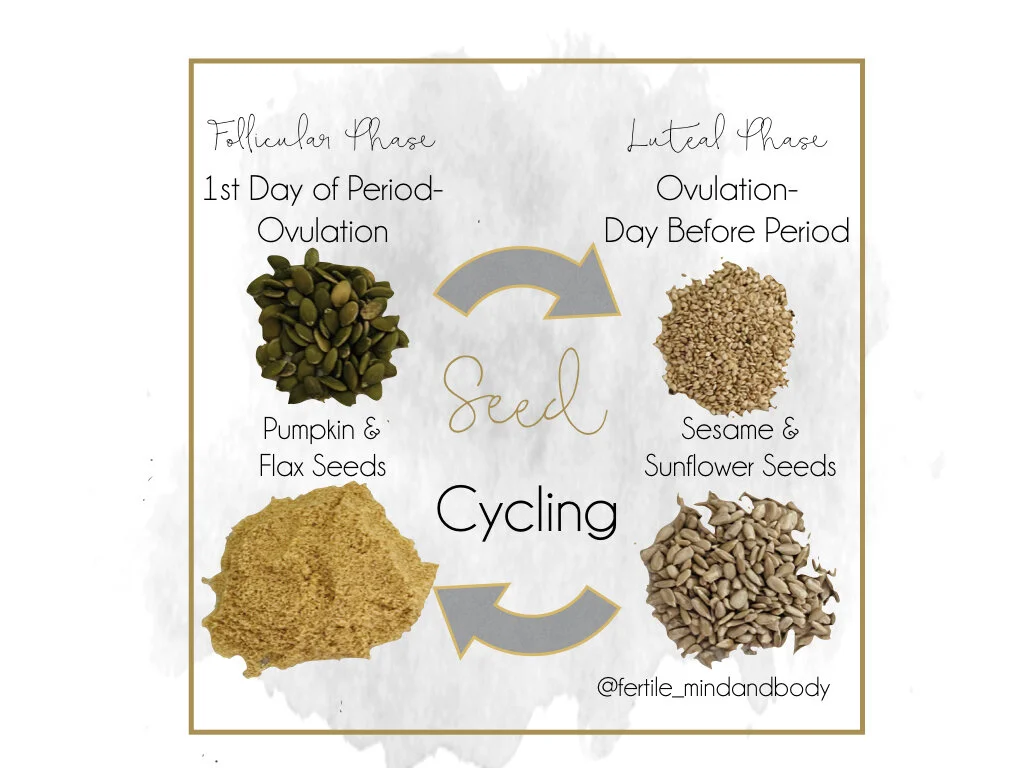
Related Articles